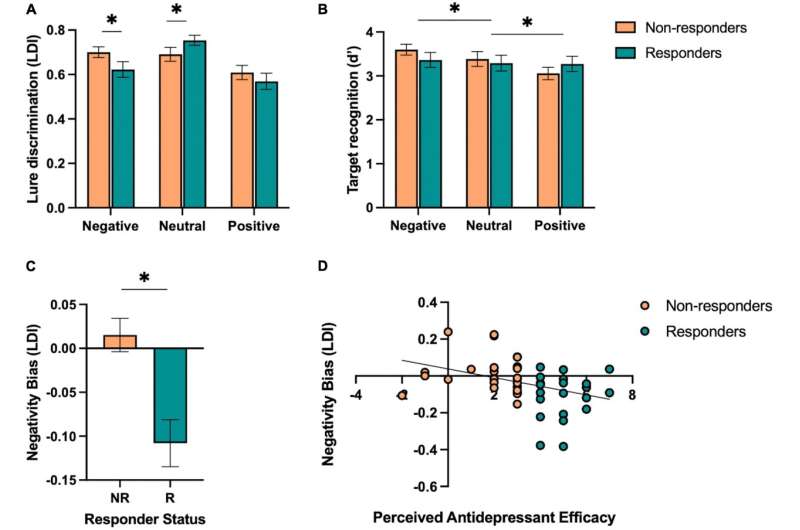This article has been reviewed according to Science X's editorial process and policies. Editors have highlighted the following attributes while ensuring the content's credibility:
fact-checked
peer-reviewed publication
trusted source
proofread
Antidepressants may reduce negative memories while improving overall memory

New research from Rice University finds that antidepressants may actually reduce negative memories in individuals suffering from depression while improving overall memory function.
The study, "Perceived antidepressant efficacy associated with reduced negative and enhanced neutral mnemonic discrimination," appears in the latest edition of Frontiers in Human Neuroscience. It examines how antidepressant use in depressed individuals affects memories, both good and bad.
Stephanie Leal, an assistant professor of psychological sciences at Rice, is the study's lead author. She said the study's main finding about the link between antidepressants and memories was an important one, because there is still much to be learned about how these drugs work.
"While antidepressants have been around since the 1950s, we still don't really know how they work," Leal said. "They only work about 50% of the time, and users often have to go through multiple types of antidepressants to get to a place where they actually feel like the drugs are beneficial. We don't fully understand how these drugs reduce depressive symptoms and why they are so often ineffective. That's a big problem."
The study's results suggest that antidepressants, when effective, can shift memory dynamics toward healthy function, Leal said.
"How antidepressants affect cognition is a hugely understudied area of research," she said. "By measuring how antidepressants impact memory, we can use this information to better select treatments depending on people's symptoms of depression."
The study included 48 participants ages 18–35. All individuals were surveyed and had been actively taking antidepressants (regardless of the type of antidepressant and diagnosis) for at least one month prior to participation in the study. A follow-up study is currently being conducted to examine how the brain responds to antidepressants. To learn more about the study, visit memory.rice.edu/participate-in … t-neuroimaging-study.
The paper is published online and was coauthored by Madelyn Castro and Lorena Ferguson, both Ph.D. students at Rice; Taylor Phillips and Rishi Vas, both former undergraduate research assistants in Leal's lab; and Amritha Harikumar, former manager of Leal's lab.
More information: Taylor O. Phillips et al, Perceived antidepressant efficacy associated with reduced negative and enhanced neutral mnemonic discrimination, Frontiers in Human Neuroscience (2023). DOI: 10.3389/fnhum.2023.1225836

















